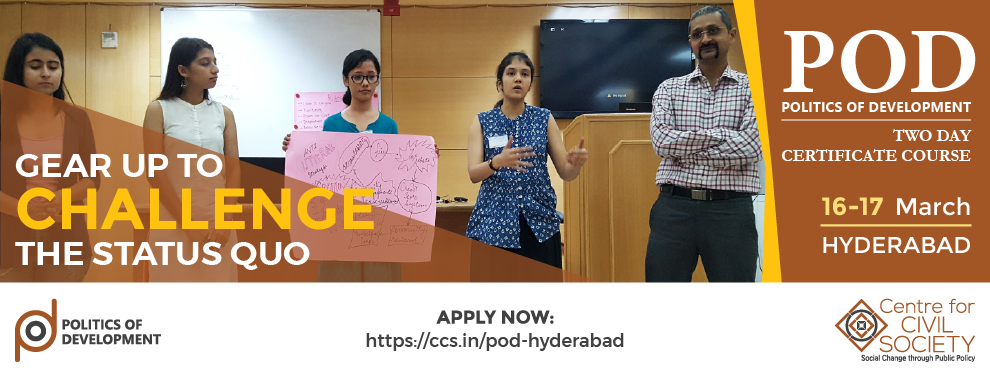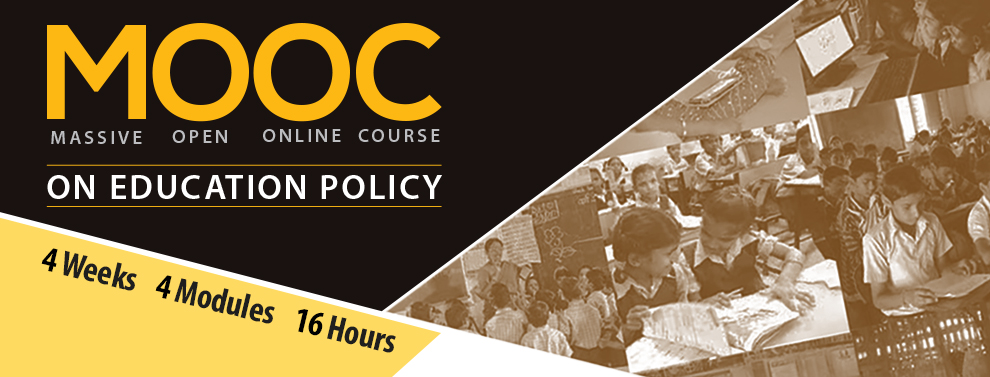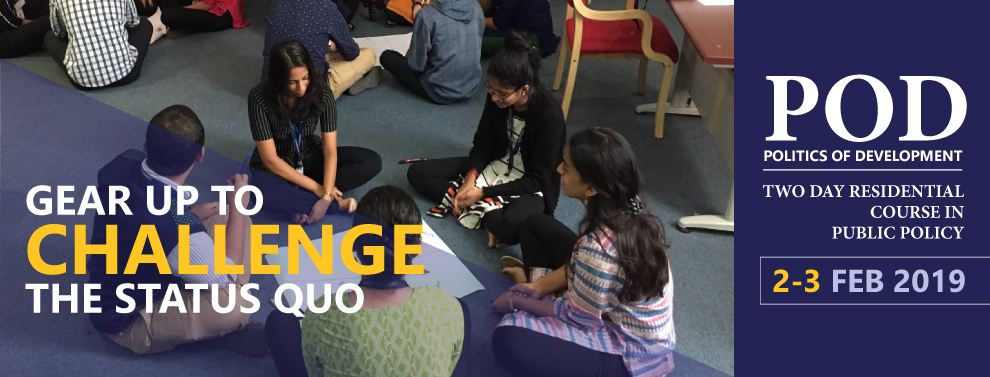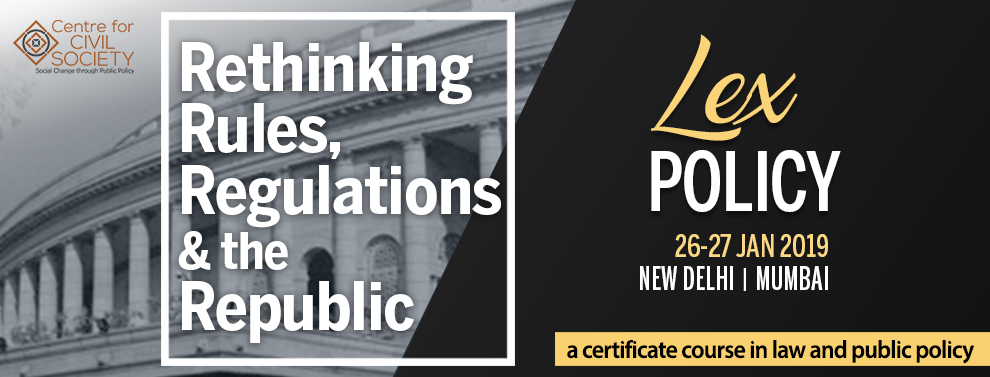You are here
Trainings
POLITICS OF DEVELOPMENT (POD) - Hyderabad
About the Program
Ever wondered why India remains poor, with the top 1% bagging more than 70% of the country's wealth? Why our political system not only falls short of the textbook ideal, but prioritizes communal politics, corruption, and cronyism?
The "Politics of Development" is a two-day immersive certificate course curated for a batch of 120 Policy Enthusiasts looking for the answers to these and many other grueling questions and striving to find solutions for the same. Our esteemed keynote speaker will take up discussions on Post-Reform Realities. Further discussions about the nuances of good governance and a deeper look into the crux of political corruption in India that are part of the program will be brought up as well.
PoD follows our philosophy for integrated learning and interactive discussions by including lectures by domain specialists, policymakers and policy enthusiasts, and supplementing them with games, movies and presentations to promote healthy group discussions.
Program Highlights:
- Keynote speakers from industry leaders and policy domain influencers
- 2-day intensive certificate course more than 100 policy enthusiasts to network with
- Engaging in interactive and thought provoking exercises with the brightest minds of the industry
Selection Process: Since the seats are limited and the candidates will be selected on a rolling basis, those who apply earlier will have a higher chance of selection.
COURSE SCHEDULE
DAY 1 | 16 March 2019 | POLITICS OF POVERTY
- 08:30 - 09:00 | Registration & Speed Networking
- 09:00 - 10:30 | Open hour with Mentors: Discussion on Pre-work
- 10:30 - 11:00 | Tea/Cookies
- 11:00 - 11:30 | Vision 2020 Activity
- 11:30 - 13:00 | Is there Really a Culture of Poverty in India? This session explores how poverty is not a result of people being tardy or unambitious but rather the result of bad policies which attack their economic freedom and property rights.
- 13:00 - 14:30 | Lunch
- 14:30 - 15:45 | Breakout session and Activity with Mentors - 1
- 15:45 - 17:15 | Regulate or Not to Regulate This session discusses how liberalisation opened the economy and lifted millions out of poverty but did not go far enough. Many quarters were left untouched and continue to suffer under the old system of state permits. At the same time, cronyism thrives in the state-controlled sectors of the economy and bad regulations continue to thwart our development.
- 17:15 - 17:45 | Tea and Snacks Break
- 17:45 - 19:00 | Breakout session and Activity with Mentors - 2
DAY 2 | 17 March 2019 | POLITICS OF PROSPERITY
- 09:00 - 10:00 | Recap and Activity
- 10:00 - 12:00 | How Can We Disrupt the Political Marketplace? This sessions advances increasing political competition through federalism and bringing in campaign finance reform as two possible solutions to increase governmental accountability.
- 12:00 - 12:30 | Tea/Coffee Break
- 12:30 - 13:45 | How good a solution is Welfare? This session argues that given the widespread poverty and rising inequality, redistribution of wealth and government welfare schemes may seem to be the obvious short-term solutions. But limiting attention only to these policies is likely to undermine the very process that has lifted millions out of poverty.
- 13:30 - 14:30 | Lunch
- 14:30 - 15:40 | Lifting Barriers for Ease of Earning a Living This session debunks how India's big government is hardly a check on big business. Instead, rampant state regulation reduces competition and increases costs of compliance for entrepreneurs making it harder for them to earn a living.
- 15: 45 -16:30 | Break
- 16:30 - 17:30 | Breakout session and Activity (Vision 2020 Part II) with Mentors - 4
- 17:30 - 18:45 | Wrap-Up and Graduation
Speakers
Barun Mitra

Barun is the founder and director of the Liberty Institute, www.InDefenceofLiberty.org, a nonprofit, independent public policy research and advocacy organization, based in New Delhi, India. Liberty Institute is dedicated to enhancing individual freedom in economic and political domains. Among the recognition the Institute has received was the Templeton Award for social entrepreneurship in 2003. Barun Mitra also received the 2005 Julian L. Simon Award for his contribution in environmental policy debates from the Competitive Enterprise Institute.
Jayaprakash Narayan
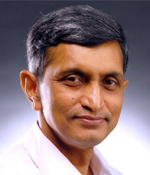
Dr. Jayaprakash Narayan is a physician by training who went into the Indian Administrative Service in the aftermath of the Emergency and failure of the Janata Experiment. He was a topper in the IAS exam. During the 16 years of distinguished public service in various capacities, he acquired a formidable reputation in the erstwhile State of Andhra Pradesh. His experience in government convinced him that faulty governance process was the biggest hurdle to India and Indians achieving greater success. And what India needs today is a fundamental change in the rules of the game and not a periodic change of players. In order to translate his vision into practical reality, he resigned from Service (IAS) in 1996 and worked with like-minded colleagues for the formation of Lok Satta. Lok Satta has now emerged as India's leading civil society initiative for governance reforms.
Join the Two Day Certificate Course in Public Policy
The program is NON RESIDENTIAL and the program fee covers food and course materials for the entire duration of the program.
Massive Open Online Course (MOOC) on Education Policy
"Glad to see your interest in MOOC. If you missed your chance to apply for the first batch please register with the link below for the next one!
Dates to be announced soon"
Register Now.
About the Program
The education eco-system in India boasts of 1.6 million schools – making it one of the largest school education systems in the world. Enrolment is at a peak 96.9% as of 2015, then why attainment of learning outcomes and poor completion rate plague the system? Why has government expenditure on education has increased progressively, despite the number of government schools declining in some states?
The "Massive Open Online Course on Education Policy" is an online course that aims to train students in research methods and the philosophical, economic, and political aspects of education policy. This course will provide a solid foundation in the theories that have influenced policy decisions over the decades and steps in the process of policy formulation, knowledge and skills necessary to analyze education policies and suggest reforms on the basis of successful pilot studies from across the world and emerging trends in the sector.
4-hour Engagement per week for a period of a month (16 hours, including a 2-hour assessment exam).
Course Fee: Rs.1999 *
*The course fee also includes a certificate by Centre for Civil Society. However issuance of certification will be upon evaluation of assessments.
Program Highlights:
- Offered entirely on a digital learning platform to reach development professionals working in the farthest ends of the country
- Comprises of 4 modules with 20 topics covered through video lectures, animations, quizzes, simulation building
- Real-time query resolution system and feedbacks
- Eminent board of mentors and experienced faculty team
Selection Process: The first batch of MOOC will comprise of 100 students only. Due to monitored enrolment, the candidates will be selected on First Come First Serve Basis.
Course Outline
Module 1: Unpacking 'Education'
- Distinction between Knowledge, Education, Schooling and Learning
- Philosophy of Education: Key thinkers and Ideas
- Diversity and Equity in Education
- State, Civil Society, and Education: Gandhi, Tagore, Radhakrishnan, Krishnamurthy
- Emergence of Curriculum: The National Curriculum Framework and SSA
- Government in Education
Module 2: Economics of Education
- The Landscape of Education in India
- Demand, Supply, Exchange - How Markets Work in Education
- Defining Schools: Public and Private Alternatives in India
- Structure of School Financing in India
- The Cost of Universal Schooling in India
Module 3: Regulatory Framework for Education in India
- Analysis of Educational Administration in India
- Reading Data in Education: Key Sources
- Evolution of Education Policy in India
- Understanding RTE
- Advancing Social Justice
Module 4: Catalyzing Quality Education Delivery - Solving Puzzles in Education
- Re-envisioning the Learning Space
- Technology in Education
- Cost-Benefit Analysis
- Reforms in Education
Faculty
Dr. Parth J. Shah
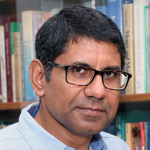
Dr. Parth J Shah is the President of Centre for Civil Society (CCS), a public policy think tank advancing personal, economic and political freedoms. In a latest survey, CCS was ranked the number 1 think tank in India and 81 globally.
Dr. Shah's research and advocacy work focus on the themes of economic freedom, choice and competition in education, property rights approach for the environment, and good governance.
Avani Kapur

Avani is a Fellow at the Centre for Policy Initiative and the Director of Accountability Initiative - a research group at CPR focusing on governance, state capacity and implementation of key social sector programmes. The focus of her work has been in building evidence for policy advocacy to strengthen transparency and accountability in public financial management for service delivery and ensure greater citizen engagement in governance systems. At AI, she has also been anchoring the publication of the annual budget brief series and implementation of fund tracking surveys on key social sector schemes including education, health, sanitation, nutrition. She is a Tech4Good Fellow and an Alumna of the London School of Economics and Smith College, Massachusetts.
Amit Kaushik

Amit Kaushik was a civil servant for 20 years, joining the Indian Railway Accounts Service in 1987. During his time in the service, he held a variety of challenging assignments, including as Director in the Ministry of HRD, Government of India, where he was associated with the implementation of Sarva Shiksha Abhiyan (SSA), as well as the drafting of the Right to Education Act. He has consulted widely, with multilateral agencies like UNESCO and UNICEF, and has extensive experience of educational planning in India and other developing countries.
Since leaving government, he has worked with organisations like SRF, the NGO Pratham, Educomp Schools and IPE Global. He is currently the CEO at the Australian Council for Educational Research (India).
Geeta Gandhi Kingdon
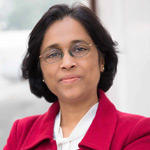
Prof. Kingdon holds the Chair of 'Education Economics and International Development' at UCL Institute of Education, University College London. She has worked for 10 years as faculty at the Department of Economics, University of Oxford. Her research is based mostly on statistical analysis of education datasets. Based on this research, she advises governments and donor agencies such as the World Bank, European Union (EU) and the UK's Department for International Development (DFID) on their education-related aid to developing countries.
She has frequently been a member of the Union Human Resource Development Ministry's 'Joint Review Missions' of Sarva Shiksha Abhiyan and of the Secondary education programme (the Rashtriya Madhyamik Shiksha Abhiyan), a member of the Uttar Pradesh Secondary Education Board (Madhyamik Shiksha Parishad), and also serves on the Government of UP's Advisory Committee on Basic Education.
In 2013, Professor Kingdon was awarded an Honorary Doctorate by Kingston University London for "her outstanding contributions to education and development".
Gurcharan Das
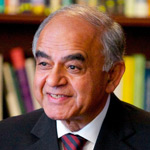
An Indian author, commentator and public intellectual. Gurcharan Das graduated with honours from Harvard University in Philosophy. He later attended Harvard Business School (AMP), where he is featured in three case studies. He was CEO of Procter & Gamble India and later managing director, Procter & Gamble Worldwide (Strategic Planning). In 1995, he took early retirement to become a full-time writer. He writes periodic pieces for the New York Times, Wall Street Journal, Financial Times, Foreign Affairs, and Newsweek.
Sridhar Rajagopalan
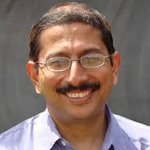
Sridhar Rajagopalan is a co-founder of Educational Initiatives Pvt. Ltd. (EI), a company that has helped change the way student learning outcomes are seen in India. EI offers ASSET, India's leading private school assessment and Mindspark, a personalised learning program that has featured as a Harvard Business Study case. Sridhar has been a member of various central and state government committees related to education including the committee for devising model rules for the Right to Education Act in Gujarat. He is currently based in the US and heads EI's US subsidiary.
Vimala Ramachandran
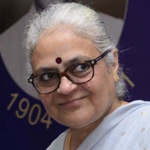
Vimala Ramachandran, has been working on elementary education, girls' education and women's empowerment. She conceptualized and launched Mahila Samakhya, a women's education program of Government of India program based in the Department of Education, MHRD. She was the Managing Trustee of HealthWatch – a network of researchers and activists engaged with women's health.
She established Educational Resource Unit in 1998 as a network of researchers and practitioners working on education and empowerment.
She has published extensively on education policy and practice, gender issues and women's empowerment.
Yamini Aiyar
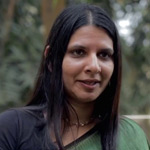
Yamini Aiyar is the President and Chief Executive of CPR. Her research interests are in the field of social policy and development. In 2008, Yamini founded the Accountability Initiative at CPR. Under her leadership, the Accountability Initiative has produced significant research in the areas of governance, state capacity and social policy.
Yamini's own research on social accountability, elementary education, decentralisation and administrative reforms has received both academic and popular recognition.
Aiyar is an Alumna of the London School of Economics, St. Edmund's college Cambridge University, and St Stephen's College, Delhi University.
Oops! Seems you have missed out on the first batch of MOOC on Education Policy.
Register here to join us for the next round of selections!
Dates for the next batch to be announced soon.
Course Fee: Rs.1999 *
*The course fee also includes a certificate by Centre for Civil Society. However, issuance of certification will be upon evaluation of assessments.
POLITICS OF DEVELOPMENT (POD)
Politics of Development - Hyderabad | 16th -17th March 2019
You can register and find more details about PoD Hyderabad here.
About the Program
Ever wondered why India remains poor, with the top 1% bagging more than 70% of the country's wealth? Why our political system not only falls short of the textbook ideal, but prioritizes communal politics, corruption, and cronyism?
The "Politics of Development" is a two-day immersive residential course curated for a batch of 120 Policy Enthusiasts looking for the answers to these and many other grueling questions and striving to find solutions for the same. Our esteemed keynote speaker, Mr. Swaminathan Aiyar will take up discussions on Post-Reform Realities. Further discussions about the nuances of good governance and a deeper look into the crux of political corruption in India that are part of program will be brought up as well.
PoD follows our philosophy for integrated learning and interactive discussions by including lectures by domain specialists, policymakers and policy enthusiasts, and supplementing them with games, movies and presentations to promote healthy group discussions.
Program Highlights:
- Keynote speakers from industry leaders and policy domain influencers
- 2-day intensive residential course more than 100 policy enthusiasts to network with
- Engaging in interactive and thought provoking exercises with the brightest minds of the industry
Selection Process: Since the seats are limited and the candidates will be selected on a rolling basis, those who apply earlier will have a higher chance of selection.
Schedule
DAY 0 | 01 February 2019
- 18:00 - 22:00 | Registration, Speed Networking and Introduction to the course
DAY 1 | 02 February 2019 | Politics of Poverty
- 09:00 - 10:30 | Open hours with Mentors: Discussion on Pre-work
- 10:30 - 11:00 | Break
- 11:00 - 11:30 | Activity
- 11:30 - 13:00 | Is there Really a Culture of Poverty in India?
This session explores how poverty is not a result of people being tardy or unambitious but rather the result of bad policies which attack their economic freedom and property rights. - 13:00 - 14:30 | Lunch
- 14:30 - 16:00 | Once Upon a Time in 1991
This session delves into India's experience with socialism and how it created a rent-seeking society with rampant corruption. As consumers, citizens werdenied goods. As producers, entrepreneurs were denied the ability to produce. - 16:00 - 16:30 | Break
- 16:30 - 19:00 | To Regulate or Not to Regulate
This session discusses how liberalisation opened the economy and lifted millions out of poverty, but did not go far enough. Many quarters were left untouched and continue to suffer under the old system of state permits. At the same time, cronyism thrives in the state-controlled sectors of the economy and bad regulations continue to thwart our development. - 19:00 - 20:30 | Dinner
- 20:30 - 22:00 | Political corruption: Authority plus Monopoly minus Transparency
This session explores why political parties often recruit candidates with criminal backgrounds and citizens vote for 'strongmen' politicians who are looked up to as Robin Hood figures. - 22:00 - 22:30 | Open Hour with Mentors
DAY 2 | 03 February 2019 | Politics of Prosperity
- 09:00 - 09:40 | Activity
- 09:40 - 11:30 | How Can We Disrupt the Political Marketplace?
This sessions advances increasing political competition through federalism and bringing in campaign finance reform as two possible solutions to increase governmental accountability. - 11:30 - 12:00 | Break
- 12:00 - 13:15 | Keynote Dialogue with Swaminathan Aiyar
- 13:15 - 14:15 | Lunch
- 14:15 - 15:30 | Lifting Barriers for Ease of Earning a Living
This session debunks how India's big government is hardly a check on big business. Instead, rampant state regulation reduces competition and increases costs of compliance for entrepreneurs making it harder for them to earn a living. - 15:30 - 16:00 | Open Hour with Mentors
- 16:00 - 17:30 | How good a solution is welfare?
This session argues that given the widespread poverty and rising inequality, redistribution of wealth and government welfare schemes may seem to be the obvious short-term solutions. But limiting attention only to these policies is likely to undermine the very process that has lifted millions out of poverty - 17:30 - 18:00 | Activity
- 18:00 - 18:30 | Wrap-Up and Graduation
Speakers
Swaminathan Aiyar (Keynote Speaker)
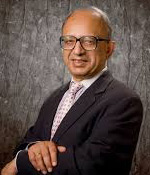
Swaminathan S. Anklesaria Aiyar is an Indian journalist and columnist. He is a consulting editor for the Economic Times and was formerly Editor of two of India's biggest economic dailies, Financial Express from 1988-90 and The Economic Times from 1992-94. He is also a Research Fellow at the Cato Institute and the elder brother of Mani Shankar Aiyar, who is a senior Congress leader.
Ajay Shah
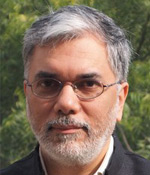
Ajay is currently Professor at the National Institute for Public Finance and Policy in Delhi. He is a former consultant to the Department of Economic Affairs at the Ministry of Finance and former Associate Professor, IGIDR. He was listed among the Top 10 economists in the Indian Express supplement 'The Most Powerful Indians in 2010'.
Mohit Satyanand
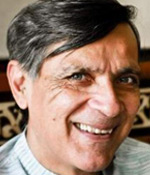
Mohit Satyanand is an entrepreneur, consultant, investor, and policy wonk. After an M.A. from Delhi School of Economics, he joined Hindustan Lever as a management trainee, moving 4 years later to Delhi Flour Mills, where he established India's first successful snack food brand, Crax. In 1989, he co-founded Teamwork Films, which now produces several of India's most prestigious arts festivals, including the Jaipur Literary Festival, and annual festivals in Singapore, South Africa, Europe, and North America.
Barun Mitra

Barun is the founder and director of the Liberty Institute, www.InDefenceofLiberty.org, a nonprofit, independent public policy research and advocacy organization, based in New Delhi, India. Liberty Institute is dedicated to enhancing individual freedom in economic and political domains. Among the recognition the Institute has received was the Templeton Award for social entrepreneurship in 2003. Barun Mitra also received the 2005 Julian L. Simon Award for his contribution in environmental policy debates from the Competitive Enterprise Institute.
Jayaprakash Narayan

Dr. Jayaprakash Narayan is a physician by training who went into the Indian Administrative Service in the aftermath of the Emergency and failure of the Janata Experiment. He was a topper in the IAS exam. During the 16 years of distinguished public service in various capacities, he acquired a formidable reputation in the erstwhile State of Andhra Pradesh. His experience in government convinced him that faulty governance process was the biggest hurdle to India and Indians achieving greater success. And what India needs today is a fundamental change in the rules of the game and not a periodic change of players. In order to translate his vision into practical reality, he resigned from Service (IAS) in 1996 and worked with like-minded colleagues for the formation of Lok Satta. Lok Satta has now emerged as India's leading civil society initiative for governance reforms.
Join the Two Day Residential Course in Public Policy
Application deadline: 27th January 2019
Fee includes food, accommodation, transport from Huda City Centre to the venue on first and last day, and learning material.
LEX POLICY - Rethinking Rules, Regulations and the Republic
Lex policy is a certificate course in law and public policy. The course will explore the various ways in which the constitution remains the fundamental determinant of government policy, and what implications it has had on India's policy success and failures.
About the Program
The Republic Day marks the day when the Constitution came into effect. Today, the Constitution is often used as an instrument for progressive change, or seen as an aspirational document of what the State should be. While it is both of them in limited capacities, it's fundamental role is to pose a set of constraints--to establish separation of powers, a system of checks and balances and to constrain the scope of legislation, among other things.
The document has been remarkable in ensuring peaceful transitions of power, protection of linguistic minorities, women's and dalits' rights and in constraining majoritarianism. At the same time, government policy has shaped its interpretation in such a way that it has failed to effectively constrain the State from intervening in citizens' lives. The Indian state's long conflict with individual liberties is manifest in constitutional cases like Champakam Dorairajan (1951), Golaknath (1967), Kesavananda Bharati(1973) and Justice K. S. Puttaswamy (Retd.) (2017). The Directive Principles of State Policy and Fundamental Rights raise some fundamental contradictions inherent in the Constitution.
These issues are not of mere academic interest. On the contrary, government intervention continues to weigh heavy on India's growth story. There are a 'million mutinies' across the country, on issues such as land rights, reservation in education and jobs, the unemployment crisis, religious freedom and others whose roots lie in an unrestrained state which acted as an arbiter of privilege for one section over the other.
On this Republic Day, join us as we attempt to understand the role of the constitution in India's history and the future that lies ahead. Seats are limited.
Speakers
Sanjiv Agarwal

Sanjiv Agarwal is an entrepreneur and inventor with patents issued in several countries. He authored 'The Indian Federalist - The Original Will of India's Founding Fathers'. In the past, He has challenged the 42nd and the 44th amendments, in the Supreme Court of India. These amendments inserted 'Socialist' in the preamble and removed the Right to Property from the fundamental rights, in the Indian Constitution. He is the founder of Good Governance India Foundation. He is inspired by Benjamin Franklin who famously said - 'If you would not be forgotten, as soon as you are dead and rotten, either write things worth reading, or do things worth the writing.'
Prashant Narang

An advocate who believes in free enterprise. Having taught at some of the best law schools across India as a visiting faculty, he is currently pursuing PhD from Center for the Study of Law and Governance at Jawaharlal Nehru University and running a YouTube channel on policy issues.
Bhuvana Anand

Bhuvana Anand is a governance and public policy specialist. Her experience spans working with donors and civil society organisations in Sudan, Afghanistan, Sri Lanka, India and the United States, in policy advocacy, managing multi-pronged programs and research. She has university and graduate level training in economics and politics, including coursework in political economy, public policy and principles of law. Bhuvana is deeply interested in institutional economics and public choice theories that help to explain the 'interest-incentive-information' motivation that guides and governs political leaders and civil servants. She received a Master of Arts in Law and Diplomacy from the Fletcher School at Tufts University and her bachelor's from St Xavier's College, Mumbai. She previously worked with the United Nations, the British Government's Department for International Development, and MIT's Poverty Action Lab. Bhuvana is currently a research advisor with CCS and was Principal Investigator for the volume Doing Business in Delhi.
Namita Wahi

Namita Wahi is a fellow at CPR, where she leads the Land Rights Initiative. Namita holds an SJD (doctoral) degree from Harvard Law School, where she wrote her dissertation on "The Right to Property and Economic Development in India". Namita's doctoral dissertation traces the historical evolution of the right to property in the Indian Constitution from the colonial period until 1967.
Namita's research interests are broadly in the areas of property rights, social and economic rights, and eminent domain or expropriation law. She has written extensively on these issues in various academic journals and edited volumes, as well as newspapers and magazines. Namita has taught courses in these areas at Harvard University, both at the Law School and the Department of Government, and at the National University of Juridical Sciences, Kolkata.
Before entering academia, Namita was a litigator with Davis Polk and Wardwell in New York, where she practised primarily in the areas of bankruptcy, securities, criminal defence and asylum law. Namita also holds an LLM from Harvard Law School, where she was awarded the Laylin Prize for the "Best Paper in International Law" and BA and LLB(Hons.) degrees from the National Law School of India University, Bangalore, where she received several gold medals for her academic achievements.
Harsh Gupta
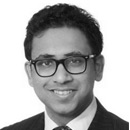
Harsh Gupta is a Delhi-based investment professional. He has a degree in economics from Dartmouth College and an MBA from INSEAD. He is also a CFA charterholder and an IIT Delhi dropout. He has written on economics and politics for Mint, Swarajya, Pragati, Wall Street Journal, Indian Express and other publications. Harsh has co-authored a book on financial derivatives published by Cambridge University Press. He earlier worked for MIT Poverty Action Lab in India and Bain in the US and UK.
On this Republic Day, join us as we attempt to understand the role of the constitution in India's history and the future that lies ahead. Seats are limited.
Program Date: 26-27 January 2019
Application deadline: 24 January 2019
Venue: YWCA International Guest House, 10, Sansad Marg, Connaught Place
Course Fee: INR 2000
Advanced ipolicy for Journalists (September 2018)
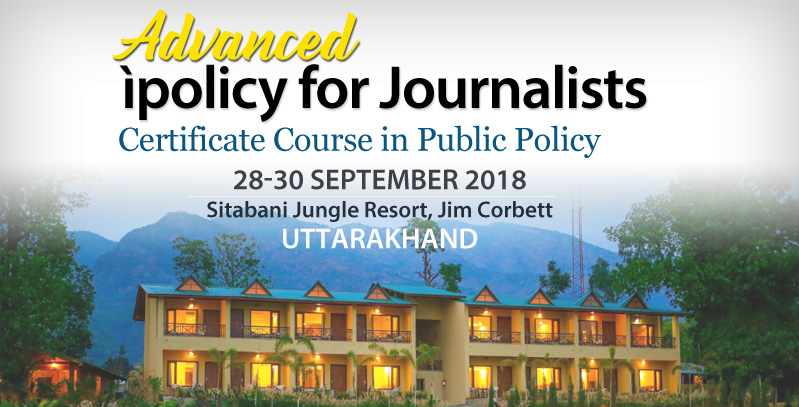
To secure freedom, prosperity, and good governance, a democratic society requires a high level of ethical and informed reporting. Azadi.me in association with Centre for Civil Society and Edelgive Foundation offers ìpolicy for Journalists, a three day residential course for journalists to equip them with tools to better understand and evaluate the effects of public policies in our day to day functioning. This award winning course focuses on issues in the key areas of education, livelihoods and good governance.
CCS is India's leading liberal think tank, ranked 81 worldwide by the annual study conducted by the Think Tanks and Civil Society Program at the University of Pennsylvania. Azadi.me is India's first and only liberal webportal in Hindi.
COURSE OBJECTIVES
- To equip participants with analytical tools to better understand and evaluate the effects of public policies so as to better distinguish between objective facts and merely subjective opinions and intentions of policies from their actual results.
- To offer unconventional angles and story ideas, information sources, and expert perspectives.
ELIGIBILITY
This course is targeted towards media professionals with some experience including senior correspondents, feature writers, beat reporters, assistant/sub-editors, producers, and anchors. Freelance journalists who have a dedicated column in reputed publication or web portal can also apply for this workshop. Up to 26 participants are chosen through a competitive evaluation process.
REGISTRATION FEE
The fee for the ìpolicy is Rs. 2,000 only which includes all meals, accommodation, and transportation to the venue and back. This fee is payable upon selection and payment can be made through online only. Fee paid once will not be returned.
APPLICATION DEADLINE – 16 September 2018


